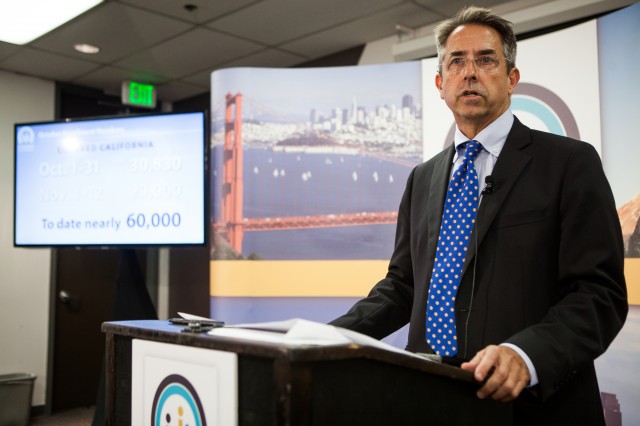Julianne Broyles of the California Association of Health Underwriters said it could be problematic if rates aren’t finalized by the time the marketplace opens in mid November.
"Anything that delays open enrollment, technological or rate review, will create chaos for consumers," Broyles said.
Proponents of the measure insist fears are overblown.
Jamie Court of the nonprofit Consumer Watchdog, which sponsored the initiative, said the ballot measure would bring the process of regulating rates into the public eye.
"The difference between rate regulation and rate negotiation is transparency. And all negotiations for Covered California over rates are done in secret," Court said.
He said if voters pass the measure, health insurance companies would have to justify their rates to the public and swear under penalty of perjury what they say is true. And he says that will be key in preventing premiums from becoming increasingly unaffordable.
Original post:
Ahead of its board meeting Thursday, Covered California officials are raising questions -- literally -- about a November ballot initiative that some say could destabilize the state's health insurance marketplace.
If approved by voters the Insurance Rate Public Justification and Accountability Act would give California's insurance commissioner the authority to reject excessive health insurance premium increases. While this idea likely sounds good to consumers, there are concerns that such authority could destabilize Covered California.
On Wednesday, Covered California released an outline of more than three dozen questions it will analyze. Among the many unknowns: a rate challenge could mean open enrollment would start without finalized premiums.
In Covered California's "Potential Operational Questions Outline" are references to the "tightly choreographed sequence" the agency must follow to meet the open enrollment deadline. "Under the current timelines, there is very little flexibility in the event there are major delays" -- delays presumably referring to challenges to rate increases.
Betsy Imholz is with Consumers Union in San Francisco. She noted that Consumers Union generally supports the kind of rate review proposed in the ballot initiative, but said the group has not yet taken a position on the California initiative.
"The questions are fair," Imholz said. "I think we all have to look at the questions and think about both the underlying policy issues and the operational issues. This is a unique situation we have here, and those questions have to be considered."
California already has a complicated regulatory health insurance environment, with two regulators governing health insurance products: the Department of Managed Health Care and the Department of Insurance.
In addition, the state law that governs Covered California mandates that the agency is an "active purchaser." Covered California has "statutory responsibility to negotiate with the (health) plans," Imholz said, "to selectively choose the best plans and get the best rates for Californians ... and that makes analyzing (the ballot initiative) a little more complicated."
[contextly_auto_sidebar id="j00e1jF7KYyWzdH7BjJKFX9oTR3NYdYH"]
Proponents of the initiative say concerns are overblown and that consumers would benefit if the insurance commissioner had veto power over health insurance rates. Proposition 103, passed by the voters in 1988, already gives the commissioner veto authority over auto, homeowner, property and casualty insurance. The November initiative would extend Prop. 103 to health insurance.
Dave Jones, California's insurance commissioner supports the initiative. When he was a state legislator, he tried more than once to pass a law giving the officeholder the authority to reject rates, and frequently points out that 35 states give their insurance commissioners the authority to reject health insurance rate hikes, but not California.
Jamie Court, president of Consumer Watchdog, which sponsored the initiative, said that "other states have health insurance exchanges and other states have health insurance rate regulations." He insisted that "there shouldn't be any concerns about timing," that rate rejection authority can work smoothly with Covered California's timeline. Rates must be approved within 60 days, he said, and that over the many years that Prop. 103 has been in effect, there have only been 10-15 hearings in "an industry with 6,000 filings a year," Court said.
Jones has previously stated that his office gets only about 100 health insurance rate filings a year.
Court said he had sent a letter to Covered California offering to meet with officials and address their concerns. But "they demurred," he said. "We're looking forward to answering (the questions) because we can answer all of them."
Covered California will take public comment on the ballot initiative at its board meeting Thursday afternoon.
